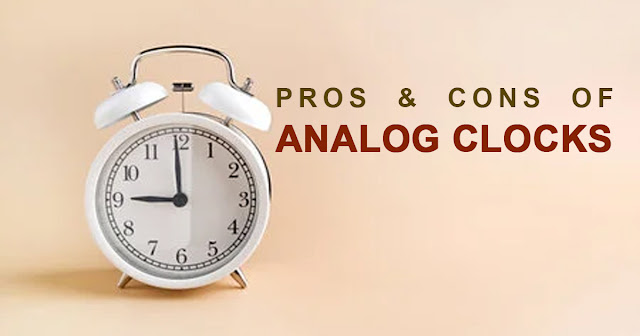Pros and Cons of Using Analog Clocks than Digital Clocks

Introduction : What is Analog Clock?
An analog clock is a traditional clock that displays time using hour, minute, and sometimes second hands, which move continuously around a circular dial marked with numbers or other symbols representing the hours and minutes. Analog clocks are typically powered by mechanical or electronic mechanisms that keep accurate time and move the hands at a steady pace. They can be found in various forms, including wall clocks, wristwatches, pocket watches, and mantel clocks, and they are often used in homes, schools, offices, and public spaces to provide a quick and easy way to tell time.
Pros of Analog Clocks
- Easy to read: Analog clocks use a simple visual format that is easy to read and understand. The hands provide a clear indication of the time, and the numbers on the clock face help users quickly identify the hour and minute.
- Classic design: Analog clocks have a classic, timeless design that adds a touch of elegance to any room or space. They come in a wide variety of styles, from antique to modern, and can be made from a range of materials, including wood, metal, and plastic.
- No reliance on electricity: Unlike digital clocks, analog clocks do not rely on electricity to function. They can be powered by batteries or even mechanical mechanisms, making them a reliable choice in areas with unreliable power supplies.
- Can serve as decorative items: Analog clocks can be used not only to tell time, but also as decorative items. They can be placed on walls, desks, or shelves to add a touch of style and sophistication to any space.
- Reduced eye strain: Some people find it easier to read analog clocks than digital clocks because the continuous movement of the hands reduces eye strain and makes it easier to track the passage of time.
- Aesthetic appeal: Analog clocks can be found in a variety of styles, sizes, and designs. They can be very ornate or very simple, and can be made from a range of materials. This means that they can be used to enhance the aesthetic appeal of a room, and can be chosen to match the decor or theme of the space.
Cons of Analog Clocks
- Less precise: Analog clocks are typically less precise than digital clocks, particularly if they are not properly maintained or if the mechanism is not of high quality. They can also be affected by changes in temperature or other environmental factors, which can cause them to run fast or slow.
- Limited functionality: Analog clocks typically display only the time, whereas digital clocks can often display additional information such as the date, temperature, or alarm settings.
- Difficult to read in low light: Analog clocks can be difficult to read in low light conditions, particularly if they do not have backlighting or other lighting features. This can make it challenging to tell time at night or in dimly lit rooms.
- May require regular maintenance: Analog clocks that are powered by mechanical mechanisms may require regular maintenance to keep them running smoothly. This can include oiling or lubricating the gears, adjusting the balance wheel, and replacing worn or broken parts.
- May be more expensive: High-quality analog clocks can be more expensive than digital clocks, particularly if they are made from high-quality materials or have intricate designs. This can make them less accessible to some consumers who are looking for an affordable timepiece.







0 comments: